Benefits Of Sleep
Do the benefits of sleep really make a difference for more beautiful skin? The answer is a resounding YES!
Getting enough quality sleep is a critical element of a glowing complexion. Because as you sleep, your body can focus on repairing and recovering, which leads to an extensive list of sleep benefits for your skin. So, when it comes to your beauty and skin care routine – getting your ‘beauty sleep’ may be the closest thing to the fountain of youth.
The optimal amount of shut-eye for a healthy adult is 7 to 9 hours of quality sleep each night. Unfortunately, it can be hard to get enough sleep regularly. Work and family obligations can often take a toll on your sleep schedule. It can be even harder to get the ideal amount of quality rest if you face high-stress levels in your life. But don’t fret, there are several simple lifestyle changes you can make to beat sleeplessness and help you get quality sleep.
Here is the truth about beauty sleep and how you can experience more of this rejuvenating sleep – so you can look and feel your best when you wake up every morning.
Sleep: A ‘Fountain Of Youth’
Simply put, sleep is like diving into the fountain of youth. It provides the conditions for your body needs to repair and revitalize. There are five sleep stages – 1, 2, 3, 4, and REM. These five stages combine to create a single sleep cycle. And, each sleep cycle takes around 90 minutes to complete. Ideally, we should experience five total sleep cycles each night. For example, during deep sleep, your body and mind are rejuvenated at the cellular level, restoring strength and function throughout your body.
Regulates Hormones
Sleep has a regulating effect on balancing hormones. When you don’t get enough sleep, it can negatively affect your body’s ability to regulate hormones. For example, lost sleep can lead to increased stress and high blood pressure. As you sleep, you experience lower cortisol levels (the stress hormone) and higher melatonin levels (the sleep hormone).
During deep sleep, the body produces hormones like growth hormone (GH) and anti-inflammatory cytokines. One of the many vital cytokines and GH processes is to repair your body’s tissue by regenerating cells. Overall, hormonal fluctuations experienced during your sleep cycles help you get beauty sleep and promote graceful aging.
Detoxifies Mind
Sleep stages detoxify your mind when brain waves during deep sleep trigger cerebrospinal fluid to cleanse the mind of toxins—washing in and out like waves. Additionally, deep sleep is a time for organ systems to get rest and your immune system to repair finally. These processes are just a few of the many repair functions occurring while we sleep.
As you can see, getting good sleep is like diving into a ‘fountain of youth.’ It is essential to revitalize the body, mind, and skin.
Indicators of Good Sleep
Amount of Sleep
It’s natural to rouse and roll over in the middle of the night at the end of a sleep cycle when you are in light sleep. If you fully wake, it should typically take less than 20 minutes to fall back to sleep.
Natural Waking
In the morning, you want to ideally wake without the alarm clock. Also, if you wake at the same time every morning, it will help program your internal circadian rhythms to adjust your sleep cycles – no more needing to hit the snooze button.
Daytime Alertness
Ultimately, the best indicator of a good night’s sleep is whether you feel refreshed when you wake up from 7 to 9 hours of sleep. Additionally, throughout the day, you are alert, maintain good concentrate, and don’t need to take any naps.
Beauty Sleep
Beauty sleep is more than just getting enough sleep cycles – it includes maximizing the revitalization process. It is about getting the right kind of good sleep, so you can wake up looking and feeling radiant. By creating optimal conditions for your body to perform the incredible tasks it’s designed for, you can get more beauty sleep — and enjoy the benefits of the ‘fountain of youth’ effect. Create optimal conditions through:
Hydration
Your skin benefits from sleep hours by healing itself from the damage caused during the day. Your body’s thermostat and lying flat increase the blood flow to your skin to help repair damage. However, to reap the benefits of increased blood flow to the skin requires you to be well hydrated. Maintaining adequate hydration will help in optimizing conditions so you can get some beauty sleep.
Nutrients
As blood flow delivers GH to the skin to stimulate collagen production, your body needs the right bioavailable nutrients. For example, Vitamin C is an essential cofactor in the synthesis of collagen. To support healthy connective tissue, you can combine a few supplements at bedtime. Vitamin C Fizz, Collagen Plus, and Skin, Hair & Nail Support can provide the building blocks necessary to support optimal conditions in your body for producing healthy connective tissues.
Cleansing
Clogged pores can prevent skin from breathing overnight. Get the most during the night hours, when your skin is busy renewing and restoring, by cleansing your skin before bed. Also, choose skin care products that optimize this recovery period so that you wake up with healthier skin!
Moisturizing
As you sleep, you continue to sweat and lose water. Optimize your skin’s ability to maintain moisture levels by staying hydrated, sleeping with a humidifier, and applying a moisturizer before you get into bed. Natural skin care products that are pH-balanced provide the perfect conditions for beneficial rehydration and anti-aging effects.
Set The Stage
Finish Tasks
Take tasks to a point you feel comfortable letting them go until tomorrow. If you have several things lingering, make a list and agree that they can wait until tomorrow – most of the time, they can wait. Aim to finish up 60 to 90 minutes before bedtime, so you have time for the following steps.
Electronics Off
Turn off all electronics at least 30 minutes before bedtime. No computers, cell phones, iPads, TVs, etc.. Also, dime the lights in your room. The shift in light exposure will help signal your brain to start producing melatonin, the hormone you need to maintain high-quality beauty sleep.
If you’re a bedtime reader, read printed materials or get a shield that goes across your Kindle/e-reader that shifts the light to a more sleep-friendly version.
Beauty Ritual
Start by removing makeup, brushing teeth, flossing, applying face treatments, and whatever else you need to do to prepare yourself for bed (like a relaxing bath). Think of this as a pampering process. Tip: Wash your face and body before bed to help hydrate skin. But, since water has a high pH level, use a mildly acidic product after washing to restore an ideal pH to your skin and ensure a night of good skin repair.
Relaxation
Take a bath with a few drops of lavender essential oil and Epsom salt. Or practice meditation; write in a gratitude journal; use any relaxation technique that works for you. Baths are great because when you get out, the change in your body temperature from hot to cool helps signal your brain to release melatonin.
Enjoy a cup of herbal tea an hour or two before bedtime to relax. Herbal teas containing hops, passionflower, lemon balm, wild oats, chamomile, or valerian can help promote relaxation.
Restful Environment
Set the stage and ensure your bedroom is comfortable, cool, and pitch black. Light is one of the most significant factors to prohibit good beauty sleep because it prevents or reduces melatonin production through the night.
Tip: The best temperature for optimal sleeping is near 65 degrees.
Ensure you have a mattress and pillow that provide adequate support and keep your body in proper comfortable alignment, as well as bedding that is soft and welcoming.
Consistent Routine
Having a routine can help improve your sleep. Plan to go to bed and wake up at the same time each day/night to support your body’s circadian rhythm. Allow yourself enough time for at least 7 hours of uninterrupted beauty sleep.
Counteract Sleeplessness
The #1 contributor to poor sleep and sleeplessness is feeling emotionally upset, such as feeling stressed and anxious. These emotions can prevent you from entering a rejuvenating deep sleep. Engaging in stress management can help alleviate emotional upset – while these other tips can help you counteract sleeplessness.
Mental Relaxation
Try guided imagery, progressive relaxation, counting techniques, and other practices to release anxiety and ease you into sleep. The 4-7-8 method is a simple technique to try – Inhale through your nose for 4 seconds, hold for 7 seconds, and then exhale through your mouth for 8 seconds, then repeat until you fall asleep. The 4-7-8 method combines relaxation breathing with a mental task like counting that helps quiet the mind enough for you to drift off to sleep.
White Noise
Try adding some background noise, such as a wave sound machine or a fan. White noise is essentially a blanket that muffles any sudden change in sound consistency that might cause you to wake, like the sound of a car passing by or the heating/AC kicking on in the middle of the night.
Avoid Disruptor
Avoid alcohol and sugar within an hour of bedtime. Alcohol may help you fall asleep initially, but like sugar, it will disrupt your sleep later on in the night. Also, reduce the amount of caffeine you consume and stop drinking it after lunchtime. Caffeine interferes with the process of falling asleep and prevents getting into a deep sleep.
Exercise Timing
Regular moderate exercise (like hiking, swimming, and yoga) helps relieve tension in the body. Some people find that moderate exercise in the late afternoon or evening helps them relax and sleep better. However, be mindful of participating in vigorous activity (like running) too close to bedtime – or you may have trouble sleeping. If you have sleeplessness, switch up your routine to finish exercising 5 to 6 hours before bedtime.
Melatonin Caution ⚠️
Many people pop melatonin as though it were a simple supplement, but there is a reason OTC melatonin has been banned for years in many countries. Melatonin is a hormone, so use cautionwith supplementation.
If you’re considering taking a melatonin supplement, you can start with 0.5 to 1 mg before bed. If that doesn’t do the trick, you can try going up to 5mg. But, it’s wise to check with your healthcare provide to look for the underlying cause of your sleep issues.
If you need sleep support, melatonin can help change your circadian rhythm to reset your internal clock. It can be especially beneficial after a daylight savings time change or travel. To give it time to kick in, take melatonin 60 to 90 minutes before bedtime.
Sweet Dreams
Beauty sleep is essential to recharge your body and mind completely. Quality sleep is like magic – it refreshes and leaves you feeling energized, optimistic, and alert. In the long run, beauty sleep will help manage stress, ward off infections and assist in graceful aging.
Here’s to enjoying more beauty sleep—Sweet dreams!
The Spa Dr.® Approach
At The Spa Dr.®, our approach is to help shine the light on skin care information and offer guidance to nurture your skin care journey. We believe the information we provide will help support your self-care and healing, and we want you to feel safe and cared for within our community!
The Spa Dr.® offers natural skin care products that are safe and free from chemicals and toxins, which disrupt hormones. Our products are specially formulated to contain key nutrients in their pure and active form to provide optimal results. In addition, our products are pH balanced towards mild acidity to promote a healthy skin microbiome.
If you are not already part of The Spa Dr. community, please join us at TheSpaDr.com and on social media.
Feel free to share this article with your friends and spread the word to promote natural beauty.
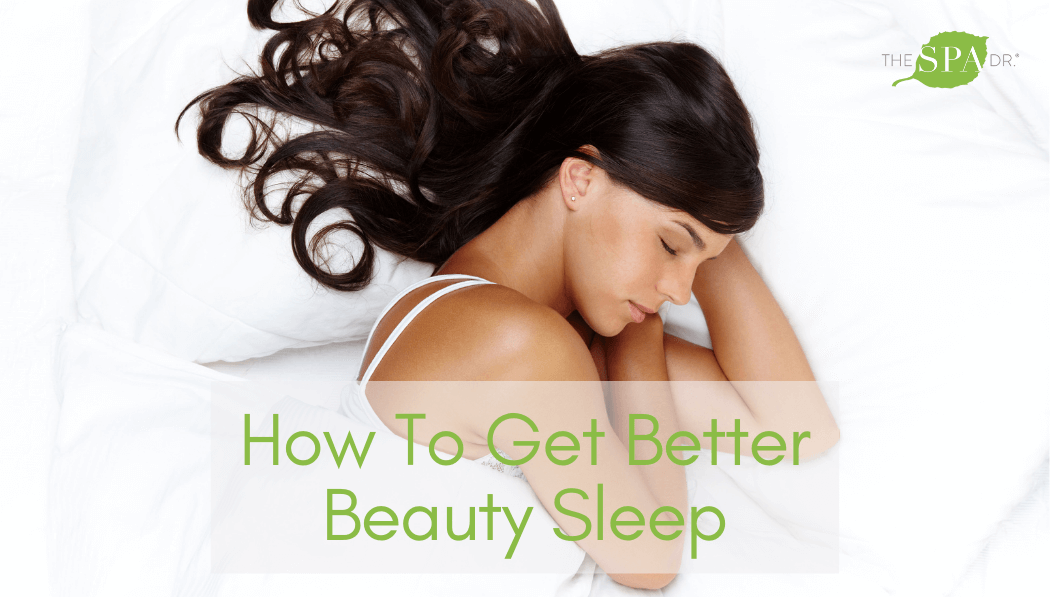
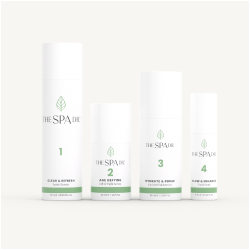
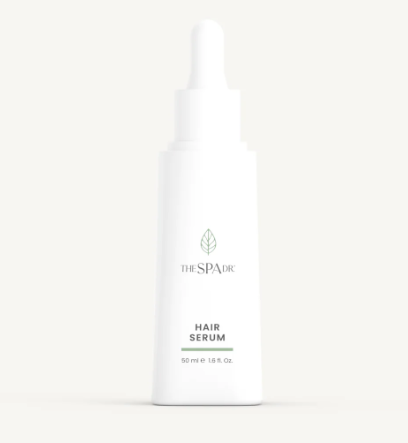
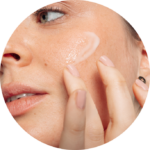
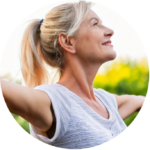
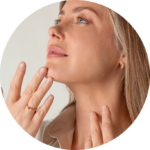
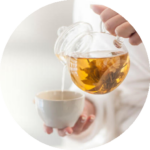
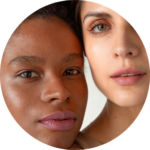
Reader Interactions
NO.4 re exercising 5 hours before bedtime… I prefer to do gym classes than exercise alone, but all the classes are in the evenings after work… Is this worse than not doing the classes at all?!
Char, that’s a good question. Can you squeeze in a class at least 4 hours before bedtime? Exercising close to bedtime may increase your cortisol levels and in the short-term lead to sleeplessness and over time can impact your adrenals. If you only do evening exercise occasionally, it’s probably okay though.